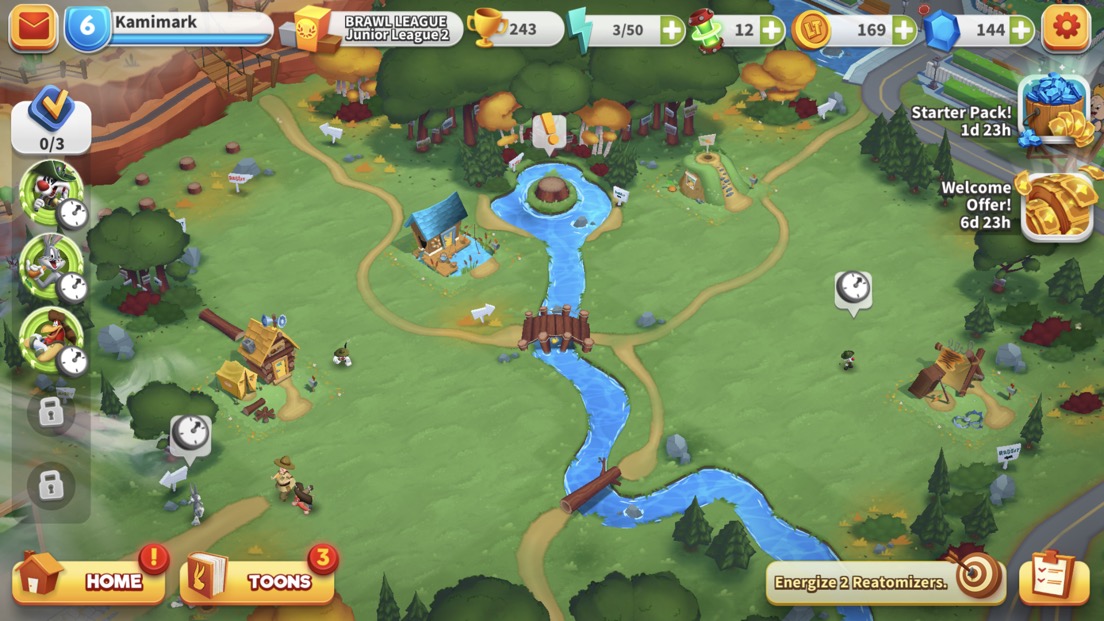- Reckoning music video, by Within Temptation: Another fantastic video
- Resist (extended), by Within Temptation: Preview with just a few tracks, rest out Feb 1. Excited as hell, WT is the best metal band since classic Nightwish.
- Savage (extended), by Gary Numan: Released last year, but 3 added tracks.
- Possessed, by Alien Sex Fiend
- I Am Above (single), by In Flames: Been a couple years since their last album
- This is Our House (single), by In Flames
- Down, Wicked, & No Good EP, by In Flames
- Battles, by In Flames
Blog
What I'm Watching and Criticizing: The Good Place
So, up front: This is a trashy show in a lot of ways, that's trying to be much, much higher and mostly failing. It exists so someone who wasted their college tuition reading philosophers can pick up a paycheck name-dropping Kant in each script; Kudos to that guy for finding a way to make philosophy pay. (disclosure: I also read philosophers in college and since, mostly on my own time, and never tried to extract money for it.) But it is not written as a philosophy treatise, though it occasionally tries; mostly it's just a dumb sitcom.
The main cast are a trashy girl-next-door mean chick, a hot chick with an English accent I hate, a philosophy nerd (irony/shitty writing: black guy, entirely teaching from texts written by old white guys, all but the latest of whom kept slaves; not a single non-honky philosophy is ever discussed), and a moron, trying to survive an afterlife where they don't quite seem to belong, run by well-past-sell-date Ted Danson and a slightly frumpy robot girl (who says she's neither), in standard sitcom cycles (literally: There's mental reboots that happen so episodes can restart at the beginning), though it does change up the formula eventually. I do like the hot chick and the mean chick; they have character. Maybe the robot girl, even limited by her role. Sadly, the nerd is one-note, the moron is barely able to breathe in and out without electric shocks, the ancient stick-figure of Ted Danson is stiff and overacts when he does break being stiff.
The key premise of the show is that you earn "points" by your actions in life, which sorts you into "The Good Place" or "The Bad Place". There's, uh, roughly everything wrong with this.
Obviously first, there's no magical afterlife. It makes no sense: There's no evolutionary advantage to an afterlife, and Humans being the only animals who can rationalize and make up stories to deal with our fear of death is infinitely more likely than that a magic sky fairy suddenly gifted Homo sapiens with an invisible remote backup system. When you die, your brain patterns rot and the program that was you ceases to be recoverable in about 5-10 minutes. There's probably nothing like an Omega Point or Roko's Basilisk for the same reason; that information won't survive from the current hot period of the Universe to the long cold efficient computational period, so no AI can reconstruct you. I'm as sad and angry about this as anyone, but I don't delude myself.
Second, even if we say "YER A WIZARD HARRY" and you have a magical afterlife, it's populated by immortal beings (IB), somehow. Where do they come from? How does that evolve? How do they get magical powers? If Humans can get a half-measure of sanity and wisdom by 40, 60, 80 years, every IB should be perfectly enlightened and know every trick and skill possible by 1000, 100000, 13.5 billion years old. The IBs shown are as stupid and easily-tricked as Humans, when you get to The Actual Plot of this show. To pick the exact opposite of this show, Hellraiser had an internally consistent magical afterlife: "Hell" is an alien universe inhabited by Cenobites with a wide range of power, whose experiences are so powerful that they would seem like torture to a Human; they collect Humans who seek that experience with magical devices, not to reward or punish meaningless behaviors on Earth; good or evil means nothing in Hellraiser.
Every IB in this show is insultingly stupid, repetitive physical tortures by frat boy demons, inferior to Torquemada's work here on Earth; farting evil robot girls; a neutral Judge too silly to be on a daytime TV show who only wants to eat her burrito. Low, low, lowest-fucking-brow comedy quite often.
Third, and most damning (heh), any system of morality with a scoring system then becomes solely about that scoring system. If "God and/or Santa are Watching" as Christians claim, you must act good according to the dictates of the Bible to score high enough to enter Heaven; it doesn't matter what's logically right and wrong, only the specific rules of an eternal sex-obsessed Middle-Eastern tyrant. Everyone who ate shellfish or wore mixed fibers or got a tattoo, forbidden by Leviticus, or failed to commit genocide & slavery when ordered by a prophet of God, as throughout the entire Old Testament, or masturbated to anyone but their lawfully wedded spouse, as forbidden by Jesus in Matthew 5:28, is gonna have a real bad eternity in Hell.
The scoring system for The Good/Bad Place makes it impossible to commit a "selfless" act unless you're a total moron (so, possibly the moron character, but he's unthinkingly rotten as often as nice). They treat this as a feature, as if you can only do good deeds when you can't see the score.
In philosophy without gods, you can choose to do good (try to define "good" in less than 10,000 pages…) instead of evil (same) because your personal or societal reward system is rigged that way (laws, in general), or because you selfishly want to look altruistic (maybe virtue-signalling to attract a mate), or because universalizing your behavior means you should selfishly do right to raise the level for everyone including yourself ("think global, act local"), or purely at random, and you have still done good deeds. While the ancient Stoics (especially my favorite, Marcus Aurelius ) respected piety to the immortalized Emperors and gods of the Pantheon, they didn't ask the gods for rules, they found a way to live based on reason, a modicum of compassion, and facing the harsh world that exists.
But once the authorities put in an objective score system in with infinite reward/punishment, you must act to maximize your score; there's no moral debate possible, you would just find the highest reward you can achieve each day and grind on it. Those born with the most wealth and privilege will be much more capable of raising their score instead of attending to life's necessities, so the rich get rewarded, the poor get punished.
This show seems to think Jiminy Cricket sits in your head as a quiet voice without any training, and you just have to listen to it to know good and evil. There's a discussion about Les Miserables re stealing bread (worth exactly -17 points), that's only used for mockery, but in real life that ambiguity is impossibly hard to make rules for.
I liked Eleanor and Tahani, and sometimes Michael, playing off each other enough to keep watching this through S2, but every time Chidi speaks I roll my eyes and wish that just once he'd reference someone not on the Dead Honkys shelf; especially not Prussian Immanuel Kant who wrote some of the earliest texts on "scientific racism", including such gems as "The Negroes of Africa have by nature no feeling that rises above the trifling" (1764, Observations on the Feeling of the Beautiful and the Sublime). Fuck that guy.
★½☆☆☆
Apoptygma Returns Sunday Music
- SDGXXV EP, by Apoptygma Berzerk
- Cosmic Chess Match single, by Apoptygma Berzerk
- UTEOTW single, by Apoptygma Berzerk
- Genesis 6 Experiment single, by Apoptygma Berzerk
- Burn - The Crow Theme Revisited, by Apoptygma Berzerk
Still not a complete new album, but good hollow electronic noise for your hollow electronic life.
What I'm Playing: Looney Tunes World of Mayhem
Yes, yet another iPhone/Android gachapon game, this time based on our beloved Saturday morning cartoon time with The Bugs Bunny/Road Runner Show. I have unkind thoughts about this genre of game, but you know, if you make one with some character I will play it to level cap, and sometimes pay for a pack later in the first week, just to get over the initial resource hump. That they're all the same except some combat gameplay tells you a lot about what kind of industrial wage-slaves make these things, though.
The classic music is there, though there's a lot of bridging music on loop. The cutscenes are fully-voiced, the rest of the game has little or no dialogue. Sadly, no audio sliders; you either have all sound on, or all sound off.
The art's classic WB style rendered in 3D; I'd prefer to have cel-shading outlines, sometimes it's a little muddy around the edges, and WB is supposed to be sharp and flat.
You're fighting cloned armies of toons created by Marvin the Martian, with your own cloned army of toons. The reatomizer sounds like The Case of Charles Dexter Ward.
Most of the game is turn-based combat with a handful of skills for each character, and the heavy ones have a cooldown of 2 or more turns; Bugs can push out a package full of dynamite, or burrow up behind someone and give 'em what for with a Louisville slugger, but then has to settle for a standard attack for a while.
So far this has been pretty good; there's tactics in characters who synergize with each other, or hate each other, so for instance my current team there is the starter Bugs Bunny as DPS mainly for the dynamite AOE attack, Hunter Yosemite Sam as my targeted DPS, starter Fishercat Sylvester Jr as healer/super-fast attacker, and Scout Sylvester as ninja (he hides after his big attack, so can't be targeted) and ally bonus with Fishercat. I just got Scout Leader Granny, who gives an Attack Up bonus to all Scout characters, so I could switch out Bugs for her, but I really don't need two heals. They give you a Scout Foghorn as a tank, but I play games in fast attack, not slow and tanky.
There are "PVP" missions to steal treasure chests from other players, guarded by a few of their toons. So far I've always won these and never had my chests stolen, but we'll see if it eventually turns on me when the cash-shop whales start mugging everyone.
And there's a World area, where you build & upgrade houses for toons, and send them on retrieval missions. I don't see that you get any other decorations or creative building options, it's very primitive, but maybe that'll be added.
At Level 7, you unlock Alliances, and I created a Mastodon/Fediverse alliance, called "Mastodon".
Finishing Happy!
Done. Parts of this worked out well, as a violent fairy tale for Christmas.
The mob boss's sister's reality TV show, bruja grandmother(?), and the sort of return of her son was both annoying as hell (fake-ass social media & TV people, ugh), and sometimes the only good parts of an episode; but the actual supernatural shit going on around this later is jarring. Imaginary friends can be seen by someone else, great premise. They can touch things, uh, this is weird… But the demonic stuff I'm not so sanguine about (the sanguinary sauce scene is great, though!)
The bad guys' constant running the kids around to different places, no clear explanation of who's coming for them, the Big Bad's weird-ass bug suit cult, Bad Santa's, uh, friends… Not tied up neatly at all. Reminds me a bit of Shadowrun's Universal Brotherhood which are really insect spirits. Grant Morrison's had insectile villains, doing radical body and brain surgery with very similar results in The Invisibles, too.
The characters remain cartoonish and hard to take seriously. And there's a homophobic vibe to some of it, two villains are gay and weird about it, there's no positive portrayals (not that anyone's positive in this show, but still). I dunno if this is intentional; Chris Meloni's pro-gay rights, has done all but gay porn in Oz, so he's probably not meaning it to be taken this way. Grant's a cross-dresser, and is weird about it, but not like this. I still went "Oh, that's not OK" a couple times.
As is often the case, even on a short series, there's a lot that could've been cut. About 2-3 episodes worth are just "Nick goes to a new location, gets in a fight, gets a clue or has to flee to the next location". The fights are good, often funny slapstick; there's axes, and a chainsaw, and a kung fu gang in Chinatown. Blood but still not a lot of visceral damage.
There's a parody of a Tarantino film scene that made me laugh out loud for over a minute, and freaked out my dog. The show keeps dragging down to boring, and then up pops a good gag and it carries me forward to the next.
If we were making a checklist:
Bad SantaSmoothieBlueNick being an asshole all the time.- Big Bad
So, still ★★★★☆, but I'm creeped out by some portrayals, and probably other people will be, too.
What I'm Watching: Happy!
So, this is adapted from a Grant Morrison comic. Grant's a crazy person; one of my favorites, but I think adapting his work is a memetic hazard, immanentizing the eschaton.
Take Chris Meloni from Law & Order: SVU, and make him a washed-up drunk ex-cop Nick Sax. Add a CGI blue flying unicorn, imaginary friend of a little girl. … Sure. And a bad Santa who's kidnapped that little girl. Nick soon convinces himself he's not hallucinating, but he's such an asshole he may not care.
This is bizarre. It veers between parody of SVU, itself so earnestly grimdark it wrapped around to comedy, and Roger Rabbit comic antics.
You never feel bad seeing Meloni get beaten, tortured, or hit by a car; he's very punchable and seems like a bad dude even when playing good, and Nick's shit. There's a lot of blood and screaming, it's as violent as a Friday the 13th film; not quite Eli Roth but not cartoony. There's a flashback scene explaining how Nick got that way, and it would be traumatic to watch if not so far past plausible.
Almost all the characters are ridiculous caricatures; and then the mother of the girl isn't. She walked in from some totally different show and everything being insane around her doesn't faze her, she just wants her kid back.
Happy the unicorn is obnoxious in the way children's cartoons are, but watching him cope with Nick's horrible life is amusing.
I don't know if this is good in any rational sense. Like, if you sat down a normal, well-adjusted person with minimal traumas and made them watch this, they'd hate it and then vomit profusely. I find it kinda charming, a new holiday special up there with Lethal Weapon and Island of Misfit Toys.
★★★★☆
New Doom WAD "Sigil" From John Romero
- Sigil announcement
- Sigil page: BRING ME THE PEWTER HEAD OF JOHN ROMERO!
- Romero's E1M8b
- Romero's E1M4b
- GZDoom runtime: Modern graphics and sound support. Kinda shitty launcher to pick your WAD files, you better know how the Doom command-line works.
- GOG Ultimate Doom: You'll need the DOOM.WAD from here. Don't use their DOSBOX runtime, that sucks.
- GOG DOOM II + Final DOOM: Same, DOOM2.WAD
Oh, holy shit yes. If you're cheap, the free download will be fine.
Just replayed E1M4b, and it's a little too intense for this early in my day; also I hate super-dark mazes, it's not fun squinting at the screen. E1M8b was a great open-area shootemup. Dunno how hard Sigil's gonna be but I'm up. Just let me get some coffee first.
What I'm Watching: Shin Godzilla
- Trailer 2 for Godzilla King of Monsters 2019: While I was very disappointed by Godzilla 2014, this one looks good, especially Mosura is beautiful and dangerous.
Recently I've watched the Godzilla anime, which are silly but sometimes fun. So, I felt I should rewatch Shin Godzilla, the most recent live-action Toho movie, by Hideaki Anno. I saw it in theatre, but I remember little of it.
The start isn't at all clear about the timeline. GMK, my favorite Godzilla movie, was based on only the original movie happening. This one doesn't even have that, Gojira has a new origin story.
The early form is ridiculous, it (normally I refer to Gojira as "she" since Minilla, Gojira Junia, Godzuki, and the terrible Roland Emmerich movie imply that she can reproduce; but here that's not the case so "it") looks kind of like Anguirus. Then it "evolves", recapitulating the costumes from the entire series… By the end it's the late '90s overpowered disco-ball of lasers form.
The mid-movie rampages are fantastic, and the SDF and US forces put up a good fight. This entire sequence is one of the best Gojira fights in any movie. Just horrifying and beautiful.
But the politics are most of this film, and Japanese politics are slow, boring, bureaucratic, bloodless and cowardly. Even if it's meant as parody, it's just not funny, it's exhausting. They literally spend half the film doing paperwork and formal meetings. The young rebel politician Yaguchi is OK, but the vast herds of men in bad suits and binders are so dull, and the supposed half-Japanese American attaché has maybe the worst fake-American accent I've ever heard. There are several others who have bilingual lines, so I don't know why they cast her.
Finally the heroic plan engages, in a race against the most stupid plan possible. They actually know what they're doing, get all the computer simulations and chemical engineering, use the city to fight Godzilla… But it's very stationary, and I find it anticlimactic.
★★★½☆ And it'd be lower if not for that epic central battle.
Update: On rewatching:
The ground-crawling instar is so adorable. It's the tiny head and goofy smile it has.
I find the Japanese bureaucracy as villain more interesting this time.
"Wishful thinking and armchair theories by the old Imperial Army in the last war led to 3 million Japanese lives lost. Beware of unfounded optimism."
—Shin Godzilla
Maybe ★★★★☆
Lessons from Gutenberg
- Lessons from Gutenberg
- Rian Rietveld
- Painfully awkward video of Dragon Naturally Speaking vs Gutenberg: By 2:48, I was saying "Motherfucker!" to my non-voice-controlled screen. It has 46 minutes to go. ?
The codebase of Gutenberg is difficult for all of us, because no one in the wpa11y team is a skilled React developer. So it was hard to implement changes and write PRs ourselves. What we could do is test, tell what’s wrong and what it should be and hope a developer would pick it up. A lot of a11y work has been done by the Gutenberg team but major issues still exist.
…
The results indicated so many accessibility issues that most testers refused to look at Gutenberg again.
—Rian Rietveld
Note "a11y" means "Accessibility", because of course we don't write it all out.
All of this suggests that Gutenberg was pushed out because it was useful in business competition with SquareSpace, not because it helps any WordPress users. The classic rich text editor was fine for many newbies, and then they'd graduate to HTML or Markdown, neither of which are rocket surgery, when they needed more control.
Despite my heavy use of JavaScript, I've never touched React. It seems to be an attempt to combine a native UI model with web rendering, which is an utterly alien environment. But there are minimal React a11y guidelines; many of these seem tedious to implement, like those dropdowns, but not impossible. This likely would've gone better with static HTML and normal JS controls where necessary to create blocks.
The Mother of All Demos
December 9, 1968, Douglas Engelbart's presentation of NLS and teleconferencing:
- Youtube: This is at 360p, most other uploads are at 240p fuzzy mud, I'd love to have a good HD one where I can read the text. Alas.
- TheDemo@50
"If in your office, you as an intellectual worker were supplied with a computer display, backed up by a computer that was alive for you all day, and was instantly responsible—responsive—to every action you had, how much value would you derive from that?"
Of course, in reality what we mostly do with that is look at social media, hardly any better than watching TV. But we could do more.
It's been years since I've watched this, and some things jump out at me as I rewatch:
The keyboard beep is infuriating, it's what I consider an error sound. And Doug's fumbling a few times, which suggests the keybindings aren't visible, well-organized, or practiced yet. We see later that they're just code mapped to keys in a resource list.
The NLS word demo is somewhat like a modern programmer's editor with code folding; but notably I don't ever use folding, it's slow (even on 1 million times faster machines!) and error-prone, sucking up far more text than expected. It's also a lot like outliners like OmniOutliner; but while I do sometimes use OO to organize thoughts, I would never keep permanent data in it, because I can't get it into anything else I use. Dumb text is still easier and more reliable; I put my lists in Markdown lists:
- Produce
+ Banana
* Skinless
Maybe the answer is we should have better tools and APIs for managing outlines? Right now I can manage dumb text from the shell, or any scripting language, or with a variety of GUI tools. OmniOutliner's "file format" is a bundle folder with some preview images and a hideous XML file with lines like:
<item id="kILRUkulXwk" expanded="yes">
<values>
<text>
<p>
<run>
<lit>Stuff</lit>
</run>
</p>
</text>
</values>
<children>
Nothing sane can read that; even if I use an xml-tree library, it's still item.values[0].text.p.run.lit to get a single value out!
If I export it to OPML, it loses all formatting and everything else nice, but I get a more acceptable:
<outline text="Stuff">
Back to the demo.
The drawing/map editor's interesting. This is pretty much what Hypercard was about, and why it's so frustrating that nobody can make a good modern Hypercard.
Basically every document seems to be a single page, fixed on screen. If a list gets too long, what happens? It doesn't scroll, just fully page forward/back.
Changing the view parameters is basically CSS; CSS for the editor! Which is what makes Atom so powerful, but it's not easy to switch between them, probably have to make your own theme plugins, or just a script to alter the config file and then reload the editor view.
Inline links to other documents in your editor, is interesting. Obviously we can write HTML links, but they have to be rendered out and no editor can figure out where a reference goes and let you click on it. Actually, this does work in Vim's help system, but nowhere else.
The mouse changed three ways since then: The tail moved to the top, the wheels became a ball which drives two roller-potentiometers inside, and then was replaced with a laser watching movement under a window. Don't look into the butthole of your mouse with remaining eye. But the basic principle of relative movement of a device moving the pointer, rather than a direct touch like Don Sutherland's Sketch light pen, or modern touch screens, or a Bluetooth stylus, remains unchanged and still the fastest way to point at a thing on a screen. Oh, and the pointer was called a "bug" and pointed straight up, Xerox copied this directly in their Star project, while everyone since Apple has used an angled arrow pointer.
The chording keyboard never took off, and I've used a few, and see why: It's incredibly hand-cramping. While a two-handed keyboard is awkward with a mouse, you have room to spread your fingers out, and only half the load of typing is borne by each hand. On a chord, each finger is doing heavy work every character.
The remote screen/teleconferencing setup is hilarious: a CRT being watched by a TV camera, which runs to a microwave transmitter; they couldn't send it over phone lines, acoustic coupler modems were only 300 baud (bits per second, roughly) at the time.
As with Skype today, every chat starts with "I can't hear you, can you hear me? Fucking (voice chat system)." Later, audio drops out, and all Doug can do is wave his mouse at the other presenter. I've joked before that the most implausible thing in Star Trek isn't FTL, even though that's physically impossible; it's not aliens indistinguishable from humans with pointy ears, half black/white makeup, or bumpy foreheads; it's that you meet an alien starship and can instantly set up two-way video conferencing.
They seem to have a mess of languages; MOL (Machine Oriented Language) is a macro assembler in modern terms. All the languages have to be adapted to NLS, they couldn't just use LISP or FORTRAN. Since changes are recorded by userid, they had git blame!
Split screen! That's a thing I love, and few editors do. You can drag a bar down from the top in BBEdit, and Atom has "Split up/down/left/right" for panes, but then you have to re-open the document in each and it's a pain.
Messaging is a public board (or rather, an outline with each statement as a message), with #INITIALS for addressing, like @USERNAME in the Twitters and such. Like those, there's too much data to process for live updating, everything runs as a batch job that can crash the database. War Computing never changes.
Cold & hot retrieval are just file search; on the Mac we have Spotlight, and can search by keywords or filename. Though I have some problems with the cmd-space search these days, and mostly open Finder and search from there to get a list of files matching various requirements, or sometimes use mdfind whatever|less from shell, then winnow down "whatever" until I have only a few results. On Windows or Linux, you're fucked; get used to very long slow full-text searches.
What NLS Did, and How We Can Do That
- Mouse, Keyboard, bitmapped displays: We have that.
- Teleconferencing: Still sucks.
- System-Wide Search: Mac users have that, everyone else is boned.
- It's faster on Linux or Windows to search Google for another copy of existing data than to search the local machine.
- Outlining to enter hierarchical data: Nope.
- All data goes into outlines contained in files.
- Code as data: Some data is program instructions, in a variety of languages, which can operate on outlines.
- To enter this outline, I had to keep adjusting my numbers, because I'm writing it in markdown text.
As mentioned above, OmniOutliner is logically very similar, but it's a silo, a trap for your data. The pro version (WHY not every version?!) lets you use Omni Automation, which is basically AppleScript using JavaScript syntax; the problem is waiting for an app to launch, then figuring out where your data is hidden inside some giant structure like app.documents[0].canvases[0].graphics[2] (example from omni docs ), just so you can extract it for your script.
Brent Simmons is working on Rainier/Ballard, which is a reimagining of Dave Winer's Frontier. I think building a new siloed language and system doesn't solve the real problem, but maybe it'll get taken up by others.
I have for some time been toying with enhancing my Learn2JS shell into an Electron application that would let you write, load, save, and run scripts in a common framework, without any of the boilerplate it needs now. A pure JS shell is just too limited around file and network access, and node by itself is too low-level to get any useful work done. I'm not sure how that works with everything else in your system. While browser localStorage of 2MB or so is sufficient for many purposes, you really want to save local files. While this doesn't force data into outlines, it makes code-as-data easy, and JavaScript Object Notation (JSON) encourages storing everything as big trees of simple objects, which your functions operate on.
(I'm having fun with Scheme as a logic puzzle; but it's not anything I'd inflict on a "normal" person trying to work on data that matters).
If you want to talk about doing more with this, reach me @mdhughes on Fediverse.




